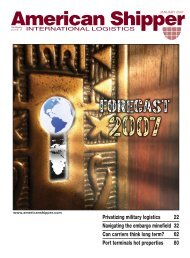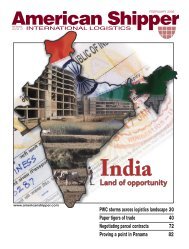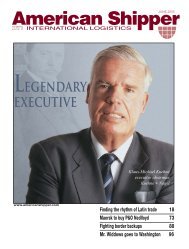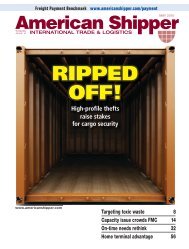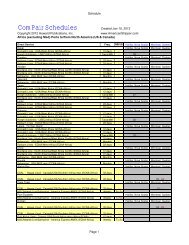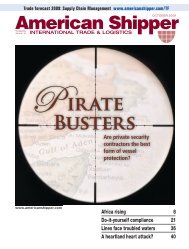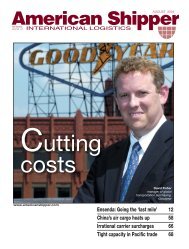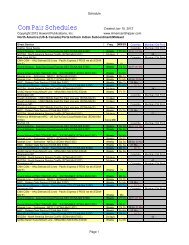LOGISTICSEC security under scrutinyFreight stakeholders welcome proposals,but are cautious about application.The European Commission’s plans fora harmonized legislation to protectthe continent’s land supply chain fromterrorist attacks recently came under scrutinyfrom a number of interest groups.Measures in the EC’s Proposal for a Regulationon Supply Chain Security, publishedFeb. 27 include:• Establish a mandatory system requiringmember states to create a security(“secure operator”) quality label whichcan be awarded to operators in the supplychain meeting European minimum securitylevels, thus allowing mutual recognition ofthe label on the internal market.• Introduce within the mandatory provisionsfor the member states a voluntaryscheme under which operators in the supplychain increase their security performancein exchange for incentives.• Make operators in the supply chainresponsible for their security performancein European freight transport.• Allow “secure operators” to benefitwhere security controls are carried out, andto distinguish themselves positively fromother competitors in the area of security,giving them a commercial and competitiveadvantage.• Allow regular updating and upgradingof security requirements, including recognizedinternational requirements and standards,through the committee procedure.“Highly prescriptive new security measuresfor all operators would lead to a breakdownof the supply chain. Yet an increasingnumber of companies are establishing theirown security management standards, notonly to protect their own operations andbrand, but also as a tool for selecting theirpartners in the supply chain,” the EC said.“It is therefore impossible in practice toestablish, in a single all-embracing operation,security rules and measures for the landtransport supply chain comparable to thosein air and maritime transport. Instead it ismore realistic to establish a framework ofminimum security requirements which cangradually evolve in line with technologicalprogress and risk developments to ensuresatisfactory security levels in an operationalenvironment.”32 AMERICAN SHIPPER: APRIL 2006BY SIMON HEANEY<strong>Shipper</strong>, logistics and port groups generallywelcomed the proposal, but voicedconcerns about its application.The European <strong>Shipper</strong>s’ Council said:“ESC has during the consultation processcalled for a voluntary ‘known cargo’ securityapproach, emphasizing that not only theshipper, but also the transport operator hasresponsibility for making and maintainingthe cargo’s ‘known’ status. The commissionproposal for a ‘security quality label’ is inline with these suggestions.”“The EC’s proposals for such a regime underthe security quality label ‘secure operator’appears to be in line with FTA’s suggestions,”said the United Kingdom’s Freight TransportAssociation, which represents British shippersand logistics companies.“ESPO welcomes the long awaited proposal,”said Brussels-based port lobby groupEuropean Sea Port Organization.However, all three interest groups voicedsome concerns.“There is no escaping to enhanced securityfor all the parties in the supply chain and forthe fact that security will add a further linein the accounts of companies involved ininternational trade,” said Nicolette van derJagt, secretary general of the ESC. “The trickwill be to ensure thatthe costs are minimizedand do not impedetrade or the overalleconomic viability ofconducting internationalbusiness.“We are also concernedthat a largenumbers of companiesvan Der Jagtand their contracted hauliers, freight forwardersand agents would apply for a specialsecurity status without very obvious andimmediate cost benefits.“A further major obstacle will be the liabilityof the different parties in the chainand their individual limits of liability: ifthis is not addressed and clarified it willbe a substantial deterrent to companiesvolunteering to participate in such a regime,”van der Jagt said.“There is a general acceptance, rightlyor wrongly, that security measures mustinevitably increase in the area of transportand freight; measures which could lead toa more restrictive operating environment.The EC proposal allows industry to decidewhether to adapt to the new security environmentor risk the potential consequences,such as delay and greater probability ofunannounced checks,” said Andrew Traill,the FTA’s head of rail freight, maritime andair cargo policy.“The key benefit cited by the proposalsfor becoming a ‘secure operator’ is thatthe transport and the cargo would receive a‘fast-track.’ But FTA believes further, moreimmediate and quantifiable benefits shouldbe given to those within the security scheme,because nobody yet knows how much ofa burden will be placed on non ‘secureoperators’ and, for many, compliance willnot come cheaply,” Traill said.“The benefits must outweigh the costs.Yet the proposals are somewhat light on thispoint and benefits, it seems, will be up tothe individual member states to determine,which could have the potential to create unfaircommercial advantages for those whosegovernments are more industry-friendly andsupportive,” he said.“The worse-case scenario, and somethingFTA has been trying to prevent for manyyears, is that security measures becomemandatory, and have no relationship with riskassessment or a company’s ability to bear thecosts of enhanced supply chain security. Thecommission makes it quite clear that failureof the market to accept the voluntary schemecould result in more stringent measures. Butthe commission and member states mustaccept a responsibility to help businessescomply, and to ensure security does not disadvantageEU companies compared to theiroverseas competitors,” Traill said.“Ports could benefit from the regulationas they become confident that cargo enteringtheir perimeter from a chain of secure operatorshas been adequately secured all along thechain. However, for successful implementationof the secure operator scheme, suchawarded operators need to be given tangiblepractical advantages,” ESPO said.“Ports should provide preferential treatment,e.g. by authorizing to use fast-tracktreatment. ESPO members are, however, notyet convinced about how to implement sucha fast-track treatment in port operations.ESPO will closely examine the proposal andthe impacts on ports and discuss the need tomake possible amendments to the proposedcommission text,” ESPO said.The full version of the EC’s proposalis available at: http://europa.eu.int/comm/dgs/energy_transport/security/intermodal/index_en.htm.The need for land supply chain reforms was
LOGISTICSfirst identified in 2003 when the EC set out totighten security in the maritime industry byamending Regulation 2454/93, also knownas the Community Customs Code.Changes to Regulation 2454/93 includea proposal to collect and prescreen advanceshipping data and an Authorized EconomicOperator (AEO) program, by which carrierswould receive “secure” traders statusby achieving security and safety standardscompliance to benefit from simplifiedcustoms procedures.The Washington-based World ShippingCouncil, which represents about 30 internationalocean carriers, is not convinced thatocean carriers will see any benefits fromthe AEO program.“Considering both that ocean carriers ininternational commerce are already requiredunder mandatory international conventions tohave ISPS Code certificates, as well as InternationalSafety Management certificates, andthat ‘the granting of any facilitation’ will bebenefits conferred on the shipper/importer,not the carrier, it is not clear why oceancarriers would need to obtain AEO status,except when their shipper customers requestthat they do so as a condition of doing business,”said the WSC in comments sent to theEC in March.“It is not clear to us why the currentcommunity legal situation for the releaseof goods — which is a matter involvingthe obligations of an importer — shouldnecessarily limit the application optionsfor other ‘economic operators,’ includingocean carriers, regarding the granting ofAEO — Security and Safety status.“Ocean carriers are not the owners of thegoods and are not the parties responsiblefor seeking the release of the goods. Proceduresfor the release of goods may haverelevance for the filing of applications forAEO — simplified customs proceduresstatus, but would intuitively seem to be ofno relevance for a carrier’s application forthe AEO — security and safety status.“Thus, we encourage the commission toreconsider this issue, including whether adistinction can and should be made betweenimporters seeking AEO status and other typesof ‘economic operators,’ ” the WSC said.The WSC had fewer issues with the “24-hour rule” amendment, although it did ask fora long implementation period. “The councilsupports a 24-hour rule strategy for containerizedocean commerce … We believe theinterest of European commerce can be servedby such a regime,” the WSC said.“At the outset, the council believes stronglythat it is not realistic to introduce a community-wideadvance cargo risk assessmentsystem until such time as all of the customsadministrations of administering port memberstates have become automated and haveelectronic data filing and sharing capabilities.It will also be necessary for member states toseek to have comparable and consistent riskscreening and assessment capabilities.“Our member carriers have found fromexperience that the kinds of changes envisionedin this draft regulation can requiresignificant administrative, operational, andeducation efforts to be implemented successfully.In order to comply with a European24-hour rule regime, it is likely that the carriers’administrative office functions wouldhave to be transferred from European officesto offices at the foreign load port.“That can require information systemchanges, business process changes, personnelchanges and training, and marketing/educationefforts. In short, these regulations willhave a significant impact on carriers andtheir customers and how they conduct theirbusiness, and will require adequate time afterthe regulations are finalized for the industryto make the operational changes necessaryto comply.“Consequently, we would respectfullyencourage that the final regulation providesfor a sufficiently long implementation periodafter the regulation takes effect and before enforcementis commenced,” the WSC said. ■Point Your Cargo Ships ona More Strategic Course.Some aim straight. We aim high. High standards. High speed. At Port Everglades yourtrucks reach landside with fast in, fast out interstate and turnpike access. There’s no stop andgo traffic. It’s mostly go. You’ll choose from several independent terminal operators to keepproductivity advancing. And nine port-owned gantry cranes–with an uptime average ofnearly 100%–ensure you’re not facing downtime for hours or days. That’s how you cut costsand move forward at full speed.Less waves. More savings.For more details about Florida’s shortest, straightest and deepestport, contact Carlos Buqueras or Manuel Almira at 1.800.421.01881850 Eller Drive Ft. Lauderdale, Florida 33316www.broward.org/portStep aboard the futureU.S. Caribbean Latin America Europe Far EastAMERICAN SHIPPER: APRIL 2006 33



